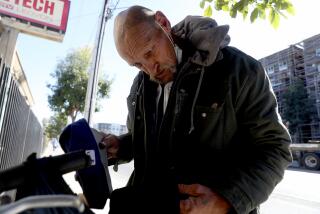VA Orders Hospital to Halt Delicate Heart Procedure
- Share via
The Veterans Administration in Washington has discontinued the coronary angioplasty program at the Long Beach VA Medical Center, which has been criticized for placing heart patients in unnecessary danger.
The decision, made this week by Dr. John Gronvall, the VA’s chief medical director, followed a review that was was prompted by an article in The Times last August. The article disclosed that Long Beach VA cardiologists had performed the delicate procedure to open clogged heart arteries on 73 patients, although the hospital had no heart surgeons on its staff to treat life-threatening complications. Since August, hospital cardiologists have performed the procedure on an additional 15 patients.
The practice is against the recommendations of a 1988 joint American College of Cardiology-American Heart Assn. task force report on angioplasty, which said that all hospitals offering the procedure should have an “experienced” heart surgery team available “within the institution” to perform emergency surgery. The comprehensive guidelines emphasize that “there should be no exception to this requirement.”
“The issue is patient safety,” according to a directive Gronvall approved Tuesday.
Gronvall overruled a site visit team’s report and instructed Long Beach VA officials to “discontinue coronary angioplasty procedures immediately” and make arrangements to “transfer patients requiring angioplasty to other VA or non-VA facilities in the area.”
Long Beach VA officials have defended the safety of their angioplasty program and said there have been no significant complications since it began in October, 1987. In interviews, they have said an arrangement for helicopter transport of surgical emergencies to Memorial Medical Center of Long Beach--about five miles away--provided adequate backup.
After conducting an on-site review of the Long Beach program last fall, a team of VA and outside experts recommended that it be allowed to continue. They cited a “well-documented and excellent” record of “mortality/morbidity,” according to a Dec. 21 VA memorandum made available to The Times.
But the VA’s national cardiac surgery consultants committee, which reviewed the recommendation for the VA medical director’s office, disagreed.
‘Highly Visible’
“The committee members were unanimous in their opinion that transfer of a patient from the (Long Beach VA) by helicopter to a community hospital clearly was outside the prescribed standards and could place the patient at potential risk,” the memorandum by Dr. Mark Wolcott, a VA assistant chief medical director, said. “The VA, as a highly visible federal agency, should as a matter of policy follow the guidelines of respected national medical groups,” such as the two heart-care organizations.
Dr. Ausma Blumentals, Long Beach VA chief of staff, said the facility was notified of the decision Wednesday and was “making plans to close” the program.
“Considering the (task force recommendations), we are not that surprised,” she said.
Angioplasty is an increasingly utilized alternative to coronary artery bypass surgery. It is performed by cardiologists, who are trained in internal medicine, not in surgery. During an angioplasty, clogged heart arteries are opened with a balloon-tipped hollow tube inserted through the skin and threaded through a groin vein to the heart.
Life-threatening angioplasty complications, such as rupture or sudden obstruction of a heart artery, occur in a small percentage--perhaps 2% to 5%--of cases, even when the cases are done by highly skilled physicians. Without quick treatment, usually immediate bypass surgery, such patients usually have severe heart attacks or die.
High Risk
While low-risk and high-risk patients can sometimes be identified, it is often impossible to predict which patients are most likely to develop complications.
“It is purely irresponsible journalism,” said Dr. Victor Froelicher, chief of cardiology at the Long Beach VA, when asked for comment about the decision. “Because (The Times) had to put it in the news, the VA central office backed out of a very good program, and patient care is obviously going to suffer.”
Dr. Arthur Graham, a spokesman for the VA’s Washington headquarters, said Gronvall and others believed that “there was the possibility of delay” with helicopter transport, citing foul weather as one such case, and “if that happened, the VA, morally and possibly legally, would have been liable for going against these published guidelines.” Graham said the decision was “final.”
More to Read
Sign up for Essential California
The most important California stories and recommendations in your inbox every morning.
You may occasionally receive promotional content from the Los Angeles Times.













